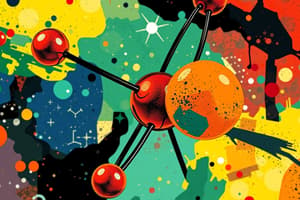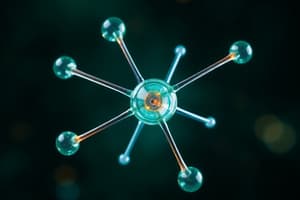Podcast
Questions and Answers
What is the charge of a cation?
What is the charge of a cation?
- It has a positive charge. (correct)
- It is neutral.
- It has a negative charge.
- It can have either a positive or negative charge. (correct)
What charge do the electrons of a calcium atom carry?
What charge do the electrons of a calcium atom carry?
- Variable charge.
- Positive charge.
- No charge.
- Negative charge. (correct)
What happens to a calcium atom when it loses two electrons?
What happens to a calcium atom when it loses two electrons?
- It becomes a calcium ion with a positive charge of +2. (correct)
- It remains neutral.
- It forms a calcium atom with a positive charge.
- It becomes unstable and breaks down.
What does the atomic number represent?
What does the atomic number represent?
What charge does the nucleus of an atom carry?
What charge does the nucleus of an atom carry?
Flashcards
Atomic number of Calcium
Atomic number of Calcium
The number of positive charges in the Calcium nucleus, which is also equal to the number of electrons in an unchanged atom, represented by 20.
Charge of an electron
Charge of an electron
An electron has a charge of -1.602 x 10^-19 Coulombs.
Calcium ion formation
Calcium ion formation
A calcium atom loses two electrons to form a positively charged calcium ion (Ca²⁺).
Charge of Calcium ion
Charge of Calcium ion
Signup and view all the flashcards
Ionic type of Calcium ion
Ionic type of Calcium ion
Signup and view all the flashcards
Study Notes
Exercise 01: Classifying Objects
- Classify objects into groups (metal, non-metal, etc.)
- Materials listed: Zinc, Balloon, PVC, Chair, Stylus, Wood.
Exercise 01: True or False
- A cation has a positive charge
- An atom is negatively charged
- Copper is reddish-brown in color
- Aluminum is attracted to magnets.
Exercise 01: Atomic Structure
- Atoms are made of a nucleus, electrons, and a surrounding cloud
- The nucleus contains a positive charge (protons)
- The number of positive charges is called the atomic number
- Electrons surround the nucleus (negative charge)
Exercise 02: Calcium Atom
- Atomic number (Z) of Calcium (Ca) is 20
- Calculate the charge of electrons in Coulombs
- Calculate the charge of the nucleus in Coulombs
- Calcium can lose two electrons, forming a Ca2+ ion
- Calculate the charge of the Ca2+ ion in Coulombs
- Formula for the Ca2+ ion is Ca²⁺
Exercise 03: Electrical Properties of Materials
- Two materials (A and B) are part of an electrical wire.
- The wire is magnified showing material B.
- Material B's electrical conductivity needs to be determined.
- Material A emits a green flame when heated.
Studying That Suits You
Use AI to generate personalized quizzes and flashcards to suit your learning preferences.




